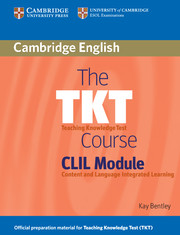Unit 17 - Support strategies for assessment
Published online by Cambridge University Press: 27 September 2023
Summary
Why do learners need support strategies in CLIL assessment?
Assessment of subject content in a non-native language is challenging for many learners. This is why learners need to be aware of what they are being assessed on and what the learning outcomes are. We need to consider how and when we can support learners during assessment and when it is appropriate to do so, especially if we are assessing them in the first stages of a CLIL programme.
Key concepts
How can we improve learners’ achievement in CLIL assessment?
At the start of CLIL programmes, we can assess learners informally by observing and questioning. Later, in some CLIL contexts we can support learners before and during assessment so they can express what they know about subject content in a non-native language. Often they have knowledge of the subject in L1 but find it hard to produce this knowledge in another language. Additional support is important as learners need to become familiar with the content and the language of the assessment. We can help learners by modifying the assessment and giving them support strategies to produce answers either orally or in writing. This is called accommodation.
Individual learners have their own particular needs. We can use task differentiation to support learners appropriately. As learners progress, fewer support strategies will be needed for the majority. However, some learners may need support for longer.
Key concepts and the CLIL classroom
Here are examples of support strategies and why they are used. In formal, summative assessment, these strategies sometimes cannot be used.
These support strategies do not mean that teachers do the work for the learners but that we should help the learners to do the work by themselves.
In formal, summative assessment, it is often not appropriate to use these strategies except in special circumstances. When any additional support is given during assessment, we should note the learner's name and what type of support was provided. Support strategies given in assessment are similar to scaffolding techniques.
Look at the following examples of assessment and the possible problems which learners may have in different curricular subjects.
- Type
- Chapter
- Information
- The TKT Course CLIL Module , pp. 95 - 99Publisher: Cambridge University PressPrint publication year: 2010

